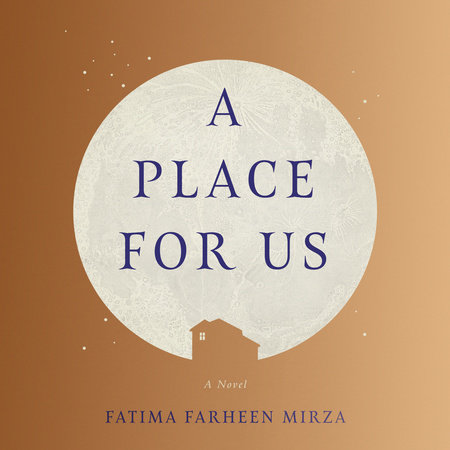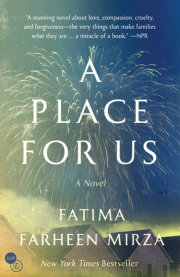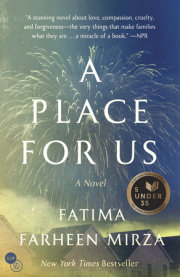As Amar watched the hall fill with guests arriving for his sister’s wedding, he promised himself he would stay. It was his duty tonight to greet them. A simple task, one he told himself he could do well, and he took pride in stepping forward to shake the hands of the men or hold his hand over his heart to pay the women respect. He hadn’t expected his smile to mirror those who seemed happy to see him. Nor had he anticipated the startling comfort in the familiarity of their faces. It had really been three years. Had it not been for his sister’s call, he might have allowed years more to pass before mustering the courage it took to return.
He touched his tie to make sure it was centered. He smoothed down his hair, as if a stray strand would be enough to call attention, give him away. An old family friend called out his name and hugged him. What would he tell them if they asked where he had been, and how he was doing? The sounds of the shenai started up to signal the commencement of Hadia’s wedding. Suddenly the hall was brought to life and there, beneath the golden glow of the chandeliers and surrounded by the bright colors of the women’s dresses, Amar thought maybe he had been right to come. He could convince them all—the familiar faces, his mother who he sensed checking on him as she moved about, his father who maintained his distance—he could even convince himself, that he belonged here, that he could wear the suit and play the part, be who he had been before, assume his role tonight as brother of the bride.
***
It had been Hadia’s decision to invite him. She watched her sister Huda get ready and hoped it had not been a mistake. That morning Hadia had woken with her brother on her mind and all day she willed herself to think as other brides must—that she would be using the word husband when speaking of Tariq now, that after years of wondering if they would make it to this moment, they had arrived. What she had not even dared to believe possible for her was coming true: marrying a man she had chosen for herself.
Amar had come as she had hoped. But when she was shocked at the sight of him she realized she never actually believed he would. Three years had passed with no news from him. On the day she told her parents she would invite him she had not allowed herself to pray, Please God, have him come, but only, Please God, let my father not deny me this. She had practiced her words until her delivery was so steady and confident any onlooker would think she was a woman who effortlessly declared her wishes.
Huda finished applying her lipstick and was fastening the pin of her silver hijab. She looked beautiful, dressed in a navy sari stitched with silver beadwork, the same sari that a handful of Hadia’s closest friends would be wearing. There was an excitement about her sister that Hadia could not muster for herself.
“Will you keep an eye on him tonight?” Hadia asked.
Huda held her arm up to slip rows of silver bangles over her wrist, each one falling with a click. She turned from the mirror to face Hadia.
“Why did you call him if you didn’t want him to come?”
Hadia studied her hands, covered in dark henna. She pressed her fingernails into her arm. “It’s my wedding day.”
An obvious statement, but it was true. It did not matter if she had not heard from her brother in years, she could not imagine this day without him. But relief at the sight of Amar brought with it that old shadow of worry for him.
“Will you call him here?” Hadia said. “And when he comes, will you give us a moment alone?”
She returned Huda’s gaze then. And though Huda looked briefly hurt, she didn’t ask Hadia to share what she was, and always had been, excluded from.
***
As she glided between guests and stopped to hug women she had not yet greeted, it occurred to Layla that this was what she might have pictured her life to look like once, when her children were young and she knew who her family would contain but not what life would be like for them. She walked with a straight back and careful smile and felt this event was hers as much as it was her daughter’s. And Amar was nearby. She looked to him between conversations, tracked his movement across the hall, checked his face for any discomfort.
The wedding was coming together wonderfully. People were arriving on time. There was a table for mango juice and pineapple juice and another for appetizers, replenished as soon as the items were lifted from the platter. White orchids spilled from tall glass vases on every table. Little golden pouches of gifts waited on each seat for guests to claim. Huda had helped Layla make them and they had stayed awake late in the night, singing a little as they filled each one with almonds and various chocolates, tugging the golden string to seal them. The hall was grand—she had chosen it with Hadia months ago—and as she walked beneath its arches into the main hall she was pleased with her decision. It had been dimmer when they first saw it, but now it looked like the set of a movie, high ceilings and every chandelier twinkling so bright they seemed to compete with one another to illuminate the room. Men looked sharp in their dark suits and sherwanis, women dressed so that every shade of color was represented, light reflecting off of their beadwork and threadwork. Layla wished her parents had been alive to see it. How proud they would be, how happy to attend the wedding of their first grandchild. But tonight even their absence could not dull all she had to be grateful for, and beneath her breath she continued to repeat, God is Great. God is Great, and all thanks are to Him.
Just an hour earlier she had helped Hadia into the heavy kharra dupatta, whispered prayers as she clasped safety pins in place. Hadia had not spoken as Layla moved about her, only thanked her once, quietly. She was nervous, as any bride would be, as Layla herself had been years ago. Layla adjusted the outfit’s pleats, hooked a teekah into Hadia’s hair, and stepped back to take in the sight of her daughter. All her intricate henna. Her jewelry catching light. The swoop of dark hair that peeked beneath her dupatta, that particular and deep red.
Now she searched the crowd for her son. It felt unfathomable that just days ago she still had trouble sleeping when the darkness called forth her unsettling fears. In the daylight she could reassure herself that it was enough to see her son’s face in the photographs she saved, hear his voice in the family videos she watched—Amar on a field trip she had chaperoned, his excitement when the zookeeper lifted up a yellow python, how his hand was the first to shoot into the air, asking to touch it. It was enough so long as she knew he was still out there, heart beating, mind moving in the way she never understood.
This morning she had woken to a home complete. Before her children could rise she took out sadqa money for them, extra because it was a momentous day, then more, to protect from any comment about her son’s return in a tone that could threaten its undoing. She drove to a grocery store and stocked the fridge with food Amar enjoyed: green apples and cherries, pistachio ice cream with almonds, cookies with the white cream center. All the snacks she once scolded him for. Was she cruel to feel more happiness, greater relief, at his return, than for her daughter on the day he had come back for? Before Rafiq left to oversee arrangements in the hall—the tables brought in, golden bows tied to the chairs, the setting of the stage where Hadia and Tariq would sit—Layla climbed the stairs to their bedroom, where he was getting ready.
“Suno,” she said, “will you listen? Can you not say anything that will anger or upset him?
She always found ways to speak around her husband’s name. First it was out of shyness and then it was out of custom and a deep respect for him, and now it would be unnatural; she felt obliged to avoid his name out of habit. He paused buttoning his shirt and looked at her. It was her right. She had not interfered with his decisions for so long. She pressed on, “Please, for me, can you stay away from him tonight? We can speak tomorrow, but let us have this day.”
The previous night, when Amar first arrived, the two of them had been amicable. Rafiq had said salaam before Layla took over and guided Amar to his bedroom, heated him a plate of dinner.
For a moment, she wondered if she had hurt Rafiq. Carefully he clasped the button at each wrist.
“I will not go near him, Layla,” he said finally, dropping his arms to his sides.
***
When he met his father’s eyes from across the crowded hall, Amar understood that an agreement had been made between them: they knew who they were there for, and why they would not approach one another beyond the expected salaam. Amar looked away first. He still felt it. His anger, and the distance it caused. It was as if something had clenched in him and could not now be loosened.
Amar had played a game during the first few conversations when asked what he had been doing lately. A painter, he said to one guest, of sunsets and landscapes. The look on their faces amused him. To another uncle he said engineer but was annoyed by how it impressed him. Once he said he was pursuing an interest in ornithology. When the man blinked back at him he explained. Birds, I would like to study birds. Now he spoke without embellishment. He excused himself from conversations shortly after they began.
He stepped out beneath the arched doorway, past the children playing, past the elevators, until the shenai quieted. He had forgot- ten what it was like to move through a crowd feeling like a hypocrite, aware of the scrutinizing gaze, of his father expecting Amar to embarrass him, anticipating the lie he would tell before he even spoke. He walked until he found himself standing before the bar on the other side of the hotel. Of course, no one invited to Hadia’s wedding would dare come here. The sound of the shenai was so far away he could catch it only if he strained to hear. He took a seat beside two strangers. Even that felt like a betrayal. But taking a seat was not the same as ordering a drink. He leaned forward until he could rest his elbows on the counter, lowered his face into his hands and sighed.
He could hardly believe that, just the night before, he had managed to walk up to the door of his childhood home and knock. What had surprised him was how little had changed—the same tint of paint at nighttime, the same screen missing from his old window on the second floor. There were no lights on. Wide windows, curtains drawn, nobody home. Nobody would know if he decided to step back into the street. It was a comforting thought—that he would not have to face his father or see how his absence had impacted his mother. The moon was almost full in the sky and as he had when he was a child, he looked first for the face his schoolteacher had said he could find there, then for the name in Arabic his mother always pointed out proudly. Finding them both, he almost smiled.
He might have walked away were it not for a light turning on in Hadia’s room. It glowed teal behind the curtain and the sight of it was enough to make his chest lurch. She was home. He had made his life one that did not allow him to see or speak to his sister, to even know she was getting married until she had called him a month earlier, asking him to attend. He had been so startled he didn’t pick up. But he listened to her voicemail until he had memorized the details, felt sure some nights he would return and on other nights knew no good would come of it. Her lit window and his own dark beside it. One summer they had pushed out their screens and connected their rooms by a string attached to Styrofoam cups at each end. Hadia assured him she knew what she was doing. She had made one in school. He wasn’t sure if he could hear her voice humming along the string and filling the cup, or carried through the air, but he didn’t tell her this. They pretended a war was coming to their neighborhood. This was Hadia’s idea—she had always been brilliant at thinking up games.
They were in an observation tower making sure nothing was amiss. Blue bird on branch, Amar said, looking out the window before crouching down again, over. Mailman driving down the street, Hadia said, lots of letters, over.
That night their father had been furious to find the screens dis- carded on the driveway, one of them bent from the fall. The three of them were made to stand in a line. Hadia, the eldest, then Huda, then Amar, the youngest, hiding a little behind them both.
“You instigated this?” his father said, looking only at him.
It was true. It had been his idea to push out the screens. Hadia stared at the floor. Huda nodded. Hadia glanced at her but said nothing.
His father said to his sisters, “I expected better from you two.”
Amar had sulked to his bedroom, closed his open window, sunk onto his cold sheets. Nothing was expected from him. And though Hadia never pushed her screen out again, he had, every few years, until his father gave up on repairing it entirely.
“Have you changed your mind?” the bartender asked him.
Amar looked up and shook his head. It wouldn’t have been so bad to say yes. It might have even been better for him and everyone else. A drink would calm his nerves, and maybe he could enjoy the colors and the appetizers and the sorrowful shenai. But he had come home for his mother’s sake, his sister’s sake, and this night was the only one asked of him.
His phone buzzed. It was Huda: Hadia is asking for you, room 310.
All day he had feared his sister might have only called him out of obligation, and suspected that maybe it was that same sense of duty that had brought him back. Now something swelled up in him, not quite excitement or happiness, but a kind of hope. He stood and stepped back toward the music. His sister, surrounded by close friends and family, was asking for him.
Copyright © 2018 by Fatima Farheen Mirza. All rights reserved. No part of this excerpt may be reproduced or reprinted without permission in writing from the publisher.








